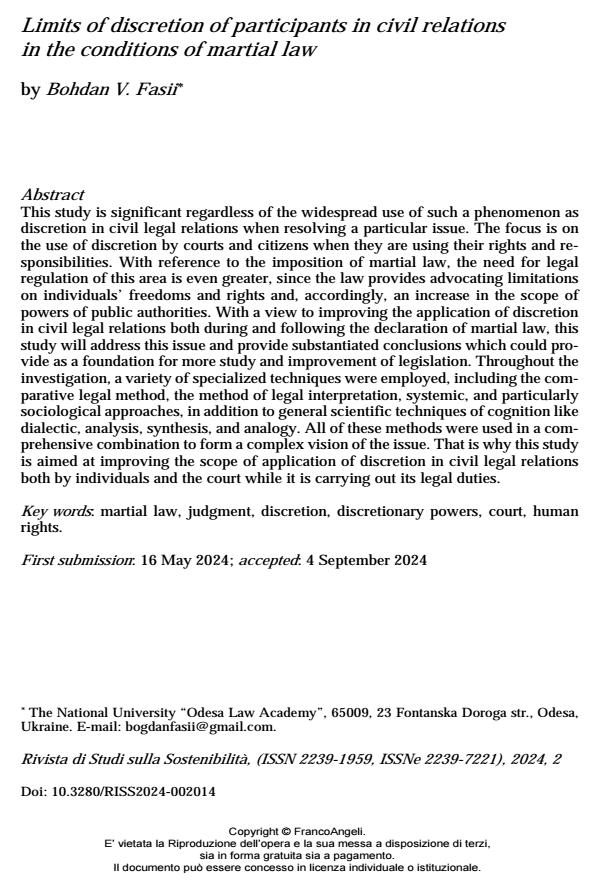Limits of discretion of participants in civil relations in the conditions of martial law
Titolo Rivista RIVISTA DI STUDI SULLA SOSTENIBILITA'
Autori/Curatori Bohdan V. Fasii
Anno di pubblicazione 2024 Fascicolo 2024/2
Lingua Inglese Numero pagine 15 P. 239-253 Dimensione file 160 KB
DOI 10.3280/RISS2024-002014
Il DOI è il codice a barre della proprietà intellettuale: per saperne di più
clicca qui
Qui sotto puoi vedere in anteprima la prima pagina di questo articolo.
Se questo articolo ti interessa, lo puoi acquistare (e scaricare in formato pdf) seguendo le facili indicazioni per acquistare il download credit. Acquista Download Credits per scaricare questo Articolo in formato PDF

FrancoAngeli è membro della Publishers International Linking Association, Inc (PILA), associazione indipendente e non profit per facilitare (attraverso i servizi tecnologici implementati da CrossRef.org) l’accesso degli studiosi ai contenuti digitali nelle pubblicazioni professionali e scientifiche.
This study is significant regardless of the widespread use of such a phenomenon as discretion in civil legal relations when resolving a particular issue. The focus is on the use of discretion by courts and citizens when they are using their rights and re-sponsibilities. With reference to the imposition of martial law, the need for legal regulation of this area is even greater, since the law provides advocating limitations on individuals’ freedoms and rights and, accordingly, an increase in the scope of powers of public authorities. With a view to improving the application of discretion in civil legal relations both during and following the declaration of martial law, this study will address this issue and provide substantiated conclusions which could provide as a foundation for more study and improvement of legislation. Through-out the investigation, a variety of specialized techniques were employed, including the comparative legal method, the method of legal interpretation, systemic, and particularly sociological approaches, in addition to general scientific techniques of cognition like dialectic, analysis, synthesis, and analogy. All of these methods were used in a comprehensive combination to form a complex vision of the issue. That is why this study is aimed at improving the scope of application of discretion in civil legal relations both by individuals and the court while it is carrying out its legal duties.
Parole chiave:martial law, judgment, discretion, discretionary powers, court, human rights.
Bohdan V. Fasii, Limits of discretion of participants in civil relations in the conditions of martial law in "RIVISTA DI STUDI SULLA SOSTENIBILITA'" 2/2024, pp 239-253, DOI: 10.3280/RISS2024-002014